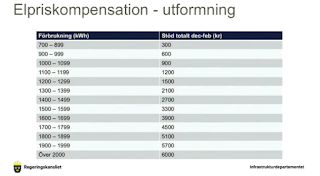Stupid Incentives for Small Electricity Consumers/Producers
As a home and solar cell owner, I've seen two stupid incentives that will encourage some to waste electricity and encourage some other to turn off their solar systems. I'm not complaining about my electricity bill, the last one happened to be very low.
Why It Is Sometimes a Good Idea to Turn Off Swedish Solar Systems
Some Swedish houses with solar panels have only covered a part of the roof. Some other house owners turn them off during fall, or choose to waste energy the last months of the year. Why? They fear they will produce too much electricity, and doing so can be expensive.
As a residential solar power owner, it is important not to produce more electricity than you consume. If that is the case, I qualify as a microproducer, and I don't need to pay Input Fees (Inmatningsavgifter) to the grid owner. If I have a surplus, the grid owner may charge me, and that may cost thousands of Swedish kronor. Fortunately, it seems that not all companies do so.
This could easily be fixed by defining a microproducer as one who produces, for example, up to 125 % of his/her electricity consumption.
 |
| No energy produced so far (duh!) |
Why It Is Sometimes a Good Idea to Waste Electricity
Recently, the government of Sweden has proposed a scheme to compensate high-volume electricity consumers for increased electricity prices. In practice, this will be six billions of Swedish kronor of helicopter money to the upper middle class, funded by the wider tax-paying population. To put it sharply, a nurse living in a small apartment will pay parts of my electricity bill.
For me, the marginal cost of electricity would be negative - I would be paid 0,80 Swedish kronor for each kWh that I consume in January.
 |
| Monthly energy consumption to the left, total compensation (three months) to the right. One who consumes 1850 kWh per month will get 1700 + 1700 + 1700 = 5100 SEK |
For January, I will get, 1700 SEK in compensation. If I increase my consumption with 100 kWh, I'll get 1900 SEK. The extra 100 kWh will cost 120 SEK - the net saving would be 80 SEK. That could be done by letting hot water go down the drain.
I would reduce my electricity bill by consuming more electricity. This is an inverted Pomperipossa-effect that is absurd.
I understand the ambition to shift the usage of fossil fuels to electricity, but a permanent reduction of the electricity taxes, or spending the money on improving the grid would be more sustainable.
Conclusion
These are two examples of how poorly designed rules can create incentives to reduce the electrical output and increase the consumption. I promise that I won't turn off my solar panels and that I won't waste electricity, but I will be very annoyed If I have to pay thousands of SEK for generating more electricity than I consume.
Calculation
My forecast for my energy consumption is between 1800 and 1900 kWh for January 2021. That will give me 1700 SEK in compensation. If I would consume between 1900 and 2000 kWh, I would get 1900 SEK. As I have a fixed electricity price of 0,36 SEK per kWh (1,2 SEK including taxes and extras), 100 extra kWh would cost me 120 SEK and give me 200 SEK in compensation. The margin benefit will be 80 SEK, or 0,8 SEK per kWh, according to the proposal.



Kommentarer
Skicka en kommentar